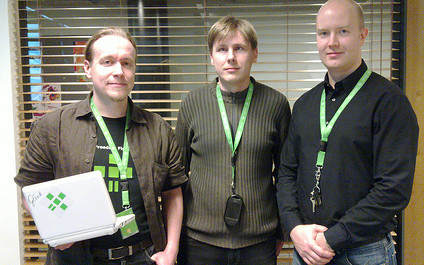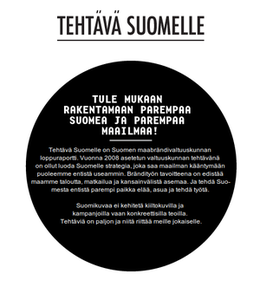Free Society Conference and Nordic Summit 2010
Benjamin Bayart, FDN: effects of the Internet are subject to Newtonian laws of reaction and counter-reaction. Compare printing press vs. copying monks to RIAA today
Working class and free software
- The industrial revolution devalued human hands, the information society devaluates human brains
- Modern industry creates more and more of wealth, but people building it have less and less bargaining power to benefit from that
- Babbage in 1842: one great advantage from machinery is the great check it imposes on the laziness and dishonesty of human agents. Technology can be designed to watch and control your workers
- Computerization of industry happened during Cold War, as US waged war on two fronts: one against the Soviets, and the other against trade unions at home. Engineers programming the machines were removed from ‘red’ influences of the manufacturing floor and in closer control of the management
- Access to the source code, and ability to deploy it is the actual control of manufacturing
- At some point the number of software engineers rose, and there was desire for closer control of their work too, like manufacturing workers were controlled. The arrogance of the technologists alienates them from the desires of those who they serve
- Skilled workers of manufacturing age lost their bargaining power as without access to the factory infrastructure their skills were useless. Same with developers working on proprietary software ecosystem
- If everything you use and work on is free software, you can take it with you when you leave your job. This gives bargaining power
- Piracy can be seen as reaction to the loss of bargaining power in workplace. If you can’t benefit from wealth created in your work, you can at least lower the price of goods to 0
- Free software has a living market of self-employed developers and microcorporations. This may be an effect of the bargaining power gained through mobility given by transferrability of your skills
- Copyleft means nobody has sole ownership and control of the manufacturing floor
- We have already greatly reduced the amount of work the society needs to strive, but little of this has translated to leisure of workers. This is mostly due to bureaucracy and competition. Free Software can be an answer
Somebody just walked past with a Declare variables, not war t-shirt
Karin Kosina, The Inanna Project: tech workshop for female artists in Damascus. They used Arduino microcontrollers and Processing interaction framework for interactive storytelling.
Interactive storytelling? Art you can actually interact with. It lets art exhibition audience to actually play and explore instead of being passive watchers.
Why Syria? Both women running the program already connections with the country. But more important was the rich storytelling culture in the country. You still have cafes where storytellers perform daily. But there was no interactive media art happening before Inanna.
Arduino is an open microcontroller board, with which you can experiment with electronics. 14 digital IO pins and 6 analog ones. 14KB of Flash memory for your own stuff.
Processing is a Java-based interaction platform, targeted at people who are not programmers. There is a dead simple IDE with your file(s) and a Play button. LGPL for the system, GPL for the IDE.
In the workshop they taught Arduino and then collaboratively created some interactive art pieces. When teaching non-technical people, the important thing is to expose the technology in a non-scary, non-serious, playful manner. This is just technology, it is OK if something won’t work.
Fortune Cookie tracks people in room with a camera, and provides the one moving most with a fortune cookie.
Combining art and technology. Heinlein: specialization is for insects
Debian packaging with Git workshop. http://sigsucc.se/talks/debian-packaging-using-git-workshop/
Smari McCarthy: This is the end of the world as we know it
- Barriers of information: our enlightenment ideals are being threatened by our amazing capability to create barriers
- On international forums representatives of representatives of representatives represent representatives, not us
- In good economic times, maintaining a resilient society is just an unnecessary burden. This is why it doesn’t happen. Just look at the recent economic crisis
- Transportation is fragile: everything else has been replaced by jet airliners, and then a volcano erupts
- The whole optimized system is built on the idea that everything will continue as it is now. And when it doesn’t, the system collapses
- Economic collapses always leads to rise of nationalism. Nationalism usually leads to wars
- Six ways to die: infrastructure-based model on why people die: too hot, too cold, hunger, thirst, illness, injury. A working society addresses all of these to some degree
- We feel entitled to having food and healthcare, but the feeling of entitlement makes us more and more reliable on large-scale organizations and infrastructure. Where is the redundancy?
- A resilient society would need only the layers of management that are related to direct survival: industry, agriculture, foreign trade, healthcare etc. This means functions like ministries of interior and exterior are unnecessary
So, what is to be done?
- IETF motto: We reject: kings, presidents and voting. We believe in: rough consensus and running code.
- Overthrowing governments might be fun and useful, but it’s also hard to do. For now being friendly works
- You never change things by fighting the existing reality. To change something, build a new model that makes the old model obsolete
- Build free communications infrastructure. Think decentralized, community-organized mesh
- Punch holes in the national firewalls. Tor, Access Now etc help. Use crypto!
- Current notion of free speech is 200 years old. The world has changed since then. Time to reconsider?
- Traditional journalism has failed. We need to be the press
- Invent new business models that are not dependent on artificial scarcity
- We can win, but only if we’re optimistic
Glyn Moody: Ethics of intellectual monopolies
- Wars: war on drugs, war on terror. 2010 may be the start of “war on sharing”, just look at the ACTA negotiated in secret
- Collision between uncontrolled, decentralized internet and centralized control of governments
- Internet has been a mainstream medium for less than 16 years
- Intellectual Property is just a branding term for enabling more monopolies
- Patents and copyright are not just monopolies, they’re actual medieval monopolies
- First English patent was issued in 1449, to monopolize Flemish glass-making technologies
- Software patents are inherently flawed as they are patents on ideas, not on real things. Wang’s patent on overlapping windows, Amazon’s one-click patent, Oracle’s patent on displaying results of database query on a web page
- Software patents is the most litigated area of patents, 26% of cases in 2002. In 90s software patent litigation cost 4 billion dollars to the US economy per year, but gave only 100 million of revenue
- Patents entrench incumbents, make things harder for newcomers and slow down innovation
- ACTA will make it a lot harder to innovate, to make new products. This will be especially hard for emerging economies that don’t have large patent pools. This is the last-ditch attempt of the West to hold on to its monopolies
- Original copyright laws in UK and US were about the encouragement of learning. The new ones are about imposing monopolies on culture
- Modern copyright terms cut public domain off from the current life. 70 years + life means we will not live to see anything produced today become public domain
- What is coming in future? Terabyte USB sticks, petabyte hard disks (store all films ever made on your hard drive!). Original CDs had no copy protection as nobody could store of transfer them with 80s computers
- The West is OK paying for content, but how about the rest 4 billion people on the planet? How can they access the world’s knowledge? Copyright should go back to encouragement of learning instead of protecting obsolete business models
- Today we live in a world of creative abundance. There are no barriers to publication. So do we need the incentive of monopolization still?
- If the society can lengthen copyright terms, it can also reduce them, or even abolish copyrights altogether
- There are precedents: first sale doctrine, opening airspace from private owners in 20s (land ownership extended up to space, meaning that all airplanes were constantly trespassing)
- 14 years has been calculated to be the optimal economic copyright term. Coincidentally, this was the original term in 1700s
- How about digital content? 14 internet years is 2 years
- Don’t talk about Intellectual Property. Talk about Intellectual Monopoly instead, as that is what it is
Free Software as permaculture
- Dependency graphs in debian packages very much resemble connections between plants that rely on each other
- Planning permaculture: Observation, Boundaries, Resources, Evaluation, Design, Implementation, Maintenance (sound familiar for software developers?)
- Engage with nature, observe, collect resources at optimal availability, ensure you actually get the useful results, discourage incorrect behavious, reduce consumptive behaviour and produce no waste
- Design from patterns to details, start by thinking of the larger picture
- Integrate, not segregate. Ensure relations work together
- Use small solutions, simple is beautiful (as in Unix Philosophy)
- Value diversity to minimize threats
- Establish where are the edges and margins of your system
- Observe change and respond creatively
Time to head for the airport. The interesting aspect of FSCONS is always that this isn’t a conference where hackers talk about what they have programmed, but instead the talks are more analysis on the effects of free software and its ideas to the society.

